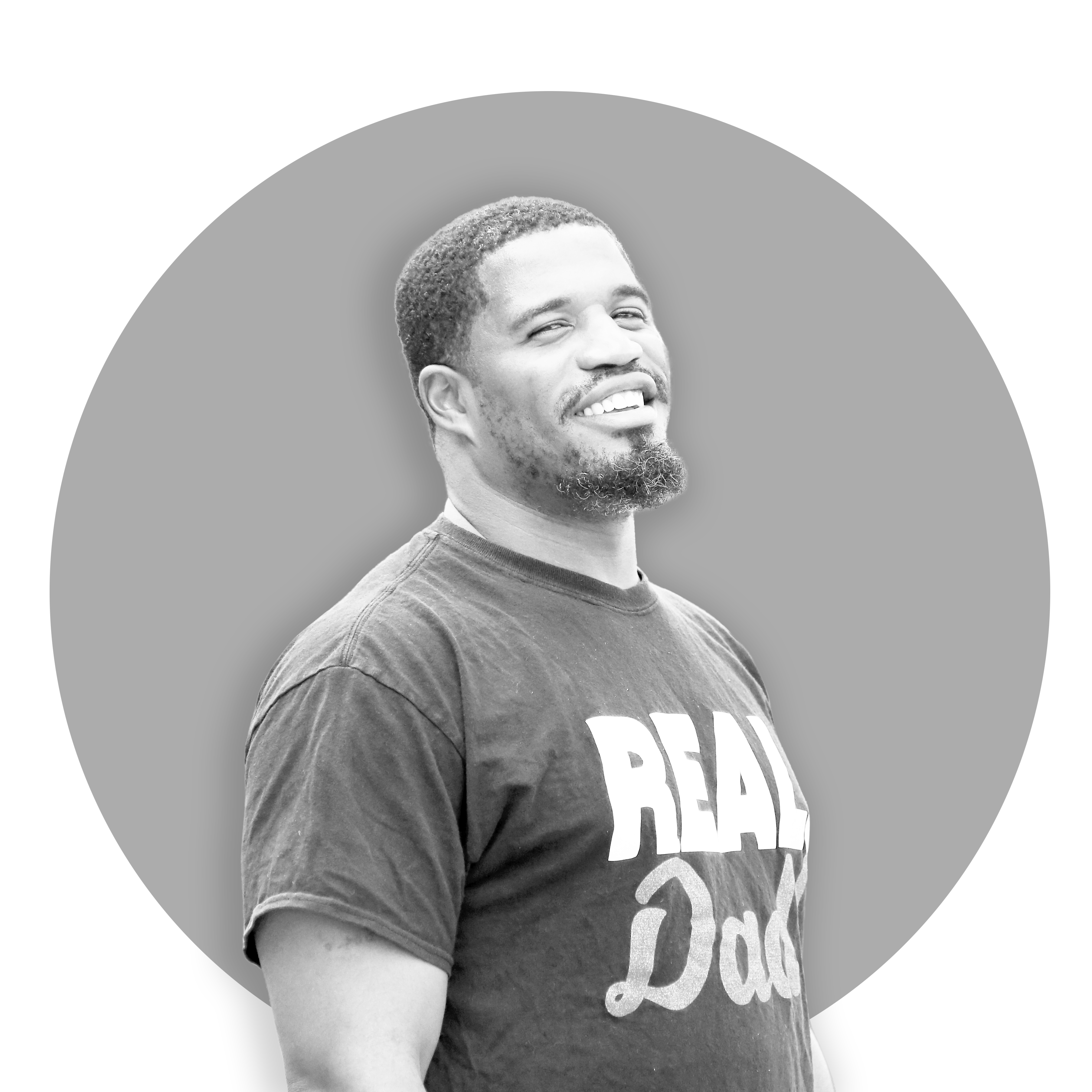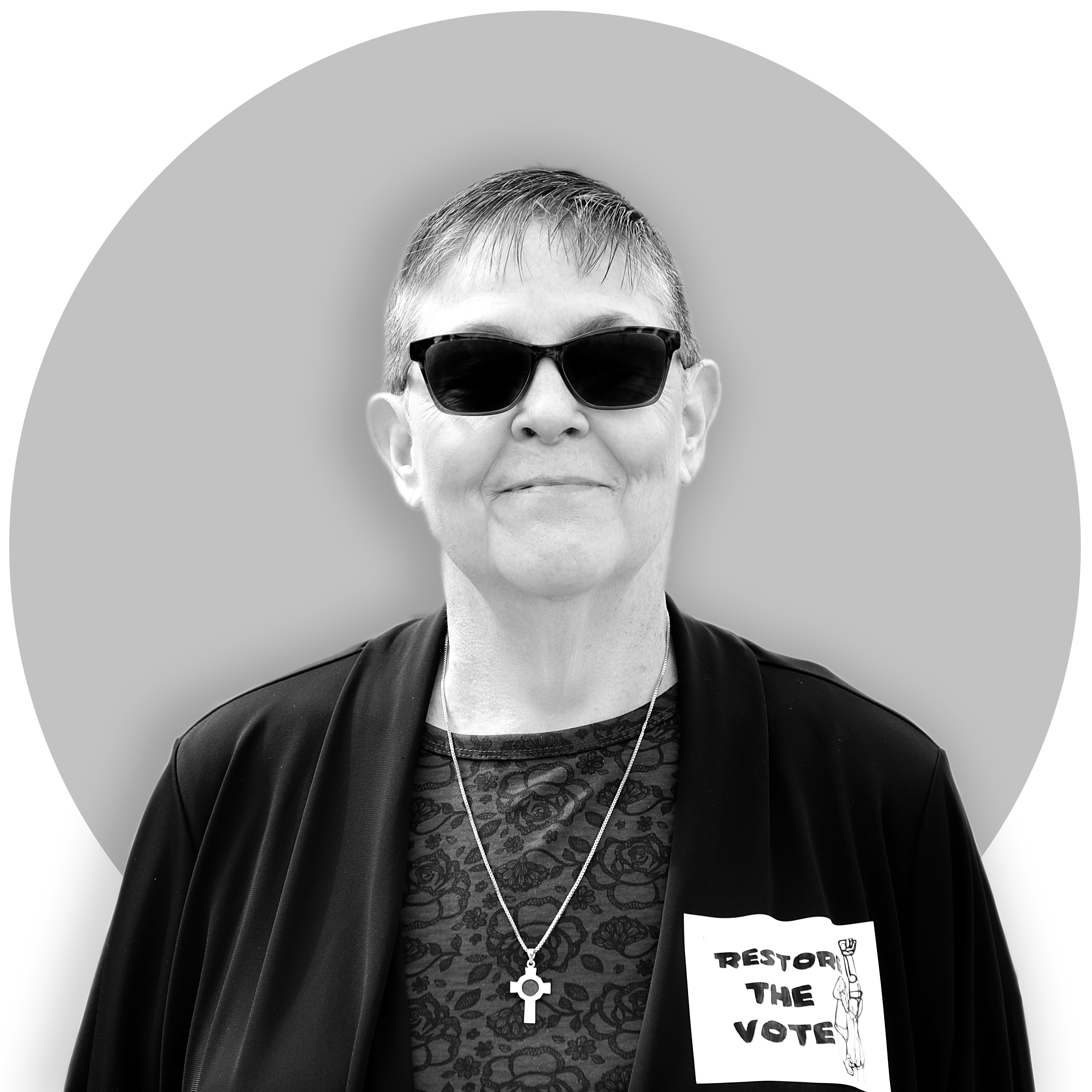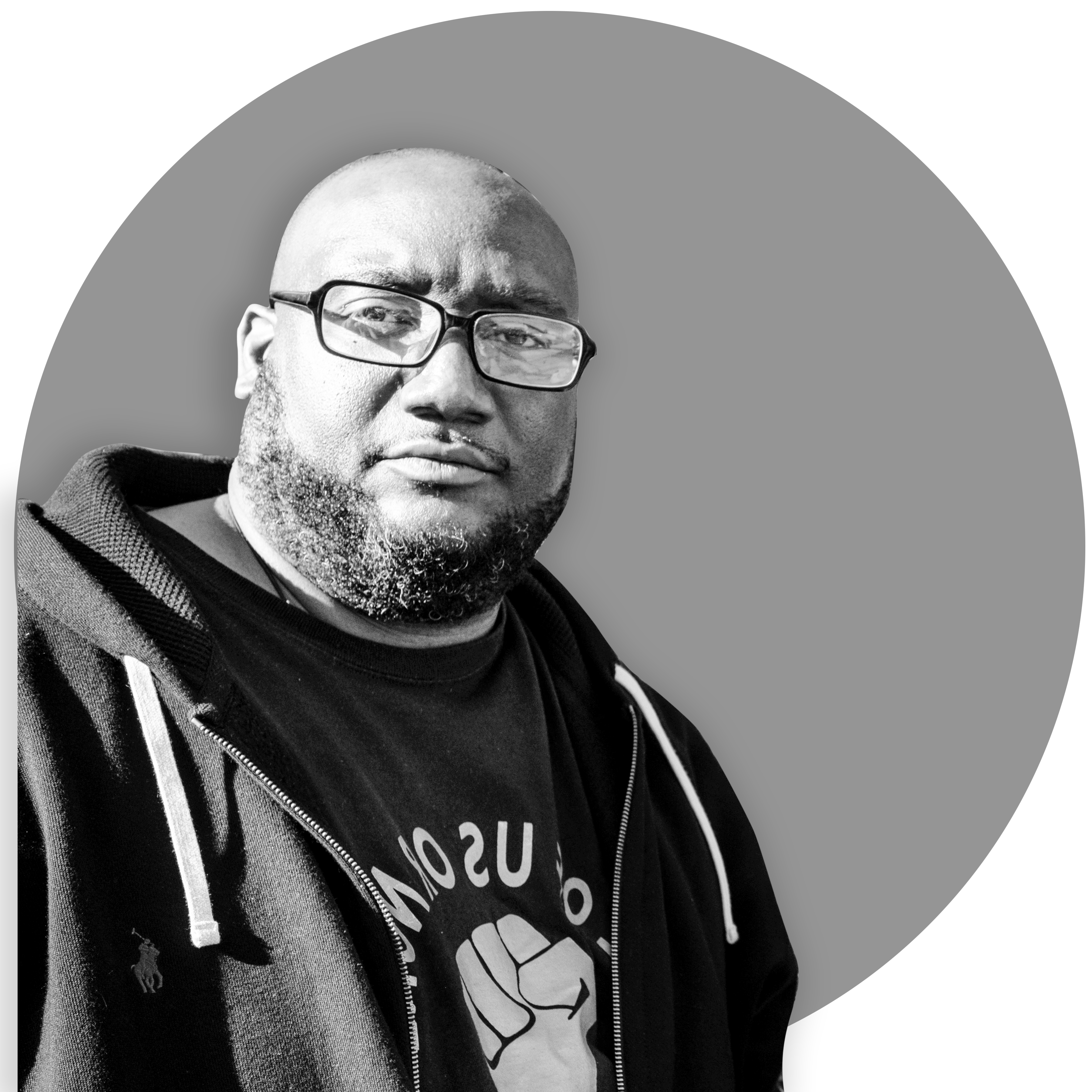Encouragement, communication and education move us forward in the fight for voting rights
2020 launched the Kentucky Democracy Project, a new campaign to register, educate and mobilize Kentucky voters to participate in the 2020 election and beyond. As Kentuckians, we can work together to build a healthy democracy where everyone has a voice and a vote. Our focus is on communities often left out of the political decision-making process – lower income communities, people of color, and young people – particularly 170,000 Kentuckians with felonies in their past who got back their right to vote.
This November KFTC spoke with three of those 170,000 to discuss what voting means to them and what it's going to take to restore and respect the voting rights of all Kentuckians. Links to the full audio interviews are listed at the bottom.
 Aubrey Clemons has always valued voting. But Clemons lost his right to vote after a felony conviction in 2006. He got his right to vote back through Gov. Andy Beshear's executive order. He lives in the Smoketown community of Louisville and is a KFTC member.
Aubrey Clemons has always valued voting. But Clemons lost his right to vote after a felony conviction in 2006. He got his right to vote back through Gov. Andy Beshear's executive order. He lives in the Smoketown community of Louisville and is a KFTC member.
Q: What is your history with voting and what does voting mean to you?
Aubrey Clemons: Voting on a personal level is really special to me because as a young man, when I was 18 I never played into politics or policies. My up-comings and my community, the last thing we thought is that our voice mattered. It was typical to hear a brother of 18, 19, 20 years old say, I’m not voting, it doesn’t mean anything.
I didn’t start hearing the conversation about voting until maybe 2004? The only reason why I voted is because my son’s mother was really big on voting. She made it a date. She’d get all dressed up and took me/us to the polls.
Unfortunately in 2006 I got into some mess in Hart County, Kentucky. I never knew that boot-legging DVDs and CDs to be sold was bad, but I lost my right to vote because of it and became a felon.
Voting was a part of our tradition as a couple, that we could have started but never got the chance to. Right after I was able to vote, right after I learned the power of my voice, I lost my right to vote. So that tradition got stomped. Even when I was in that place, serving my time in the state of Kentucky, she would always call me and let me know that she voted, that it was voting time. She had my kids out there excited to vote for Obama, twice! It’s really a big deal to me.
Q: How did it feel to vote in the General Election this year?
Aubrey Clemons: I had two first-time voters with me that day, so it was double exciting to use my voice and help these two use theirs. I posted a photo of myself on Facebook saying, hey, I voted! A KFTC staff person asked, hey can I share your picture? And I said sure, go ahead.
When he shared that picture I felt so much encouragement. I felt like, wow this is a big deal. I remember being in Frankfort fighting for this. I felt like one of the fighters who could really feel the victory. I felt really good then and I felt really appreciated.
The consistent encouragement from KFTC really made me believe that it was possible. Whenever I went down to Frankfort I believed it was just a matter of time. I believed it was going to happen, it was just a matter of time. These people are consistent. They’re consistent with me, with the movement, with the policies, they're consistent as an organization. That’s why I became a member in the first place. It was the consistency and encouragement. The encouragement pushed me for the long run. I’m literally voting now. I’m a felon and I’m voting, right now! I’m gonna vote again and keep on with it.
Q: What’s it gonna take to restore voting rights for everyone?
Aubrey Clemons: The same thing that got us to this point. The consistency of the mass of voices. Right now is a prime opportunity to make the conversation about democracy more common in the household no matter what demographic you’re living in. The conversation should be more common, more fluent, people shouldn’t feel intimidated. … If people talk about it amongst their community and it's a more common conversation, then people will want to be a part of it, the movement and everything. The encouragement of, hey, your voice matters, we can do this as a unit.
The more backgrounds, different walks of life get involved they’re gonna start running for office and really start changing a lot of the things that are going on in Frankfort. The imagery, the conversations and the language that’s used in those spaces will be powerful if more voices are included. Because even though we’re all Kentucians, we have a different voice and a different sound. No one should feel left out because they don’t look like the “majority.”
 Debra Graner grew up in Pennsylvania, lived in Oklahoma, and moved to Kentucky in 2008 with her husband, Fred. She lost her right to vote after an accidental fire in her home resulted in an arson conviction in 2012. In 2019, she was one of 170,000 Kentuckians who got their right to vote back when Gov. Andy Beshear issued an executive order. She worked with KFTC this year to reach folks with a felony and let them know they might now be able to vote. She voted in the 2020 elections.
Debra Graner grew up in Pennsylvania, lived in Oklahoma, and moved to Kentucky in 2008 with her husband, Fred. She lost her right to vote after an accidental fire in her home resulted in an arson conviction in 2012. In 2019, she was one of 170,000 Kentuckians who got their right to vote back when Gov. Andy Beshear issued an executive order. She worked with KFTC this year to reach folks with a felony and let them know they might now be able to vote. She voted in the 2020 elections.
Q: What’s something you’re looking forward to in 2021?
Debra Graner: There are still so many people that we need to gather up in our arms and make sure they understand the vote, why it’s important, and encourage and ask them how it makes them feel as a person.
I always took voting for granted until I lost my right to vote in 2012. I was kind of like an ostrich with my head in the sand. When I found out I couldn’t vote I shoved it all away and didn’t want to think about it. Then in 2018 when I happened upon KFTC, my interest was renewed. I never thought I’d learn as much as I have about voting and all the ins-and-outs in such a short time.
If this past election doesn’t prove that you need to exercise your right to vote, to use your voice, then I’m not sure where people are coming from. So that’s why I know KFTC or any other organization that’s into voting rights needs to go out and foster people who are not so inclined to vote and help them walk through it and understand why it’s so important.
Q: What does it look like to “wrap people up in our arms” or “foster” folks into this voting rights movement?
Debra Graner: Going out and having town meetings and going out into underserved areas like so many folks are already doing. Really sitting and talking, almost teaching, you know, teaching a class about voting and understanding the vote. Anything to educate people.
To feel comfortable to vote, you need to have some understanding of the system and what it means.
I think education is a key component to helping everyone feel that their vote makes a difference, that it makes a difference to vote.
Q: What does voting mean to you?
Debra Graner: It’s the most precious part of democracy to be able to vote for people that are going to do something good and are representative of the folks that they are representing! If we really want to do democracy in its fullest, we gotta take part. We’ve got to push ourselves out there to make sure we’re doing our end of the deal or it just doesn’t make a whole hell of a lotta sense. You can’t sit here and complain about something if you’re not going to try and work on it from your end or my end. You know what I mean? It’s a process and we all need to take part in it. And something you don’t realize until you don’t have the option. I hate to see people get in that situation, you know, and never come out of it.
I’m anxious to see any kind of data showing how many people were truly reached, then figure out what we need to do to get out there and engage with the folks who still do not know that they got their right to vote back. The work’s not yet done.
 KFTC spoke with Savvy Shabazz on November 11, 2020 about his experiences as an organizer, what voting means to him as a Kentuckian whose felony conviction was not included in the Governor's executive order, and what he thinks it’s going to take to get more people ready and excited to vote. A few days after this interview, Shabazz received news his voting rights pardon was accepted by Gov. Andy Beshear.
KFTC spoke with Savvy Shabazz on November 11, 2020 about his experiences as an organizer, what voting means to him as a Kentuckian whose felony conviction was not included in the Governor's executive order, and what he thinks it’s going to take to get more people ready and excited to vote. A few days after this interview, Shabazz received news his voting rights pardon was accepted by Gov. Andy Beshear.
Shabazz grew up in Paducah and gave a special shout to Elmwood Court, the low-incoming housing project he and his family lived in. He visits his hometown often and helped organize McCracken County voters throughout the 2020 election season but now lives in Louisville. Over the years he’s gained experience as an effective community leader working with organizations, such as the Louisville Urban League, The Bail Project, All of Us or None, and his own reentry program, Life Coach Each One Teach One Re Entry Fellowship.
Q: Do you have advice or words of encouragement for organizers and Kentucians who want to do this work?
Savvy Shabazz: We’re going to be focused in 2021, not only on voter restoration and voter engagement but voter education. We believe if people knew the importance of voting, we think that could change a lot of the minds and hearts. Because we have people that don’t vote, we have people that refuse to vote, we have people that cannot vote. I think if we have more education about voting I think we’ll be more successful and get a lot more people out to the polls if they just knew.
And I think we need to get the right people in the right positions as well. When we made the list for Hopkinsville, I didn’t go there. I only know a handful of people there so instead we decided to find a community leader who knows everybody. She worked that list the same way I worked mine in Paducah. She knew everybody on the Hopkinsville list, so it’s like putting people in the right place.
There’s something about when I say it matters that people listen. Not everybody is going to be able to go to my hometown and set the example. That’s what I’m looking for, people to set an example. If he can do it, you know, that’s my friend, that’s my nephew, or that’s my relative. I’m going to support them in that and I’m going to vote too. That’s what we need and that’s what I mean when I say, getting people into the right places. We gotta recognise who are the leaders in our communities, who those voices are, who has the power to relate to the people in the demographic we’re focused on.
Q: What does voting mean to you?
Savvy Shabazz: When we’re talking about voting, I first hand know. I haven’t been able to vote since 2002. I know what it’s like to get out and feel like you’re not a full citizen anymore. You’ve done your time, paid your dues to society and you still do not have the right. It’s not a privilege, it’s a right. That’s what we have to get people to understand, it’s our right.
What does it mean to me? It means that I’m a full citizen. It means equality. It means that I’m equal to everybody else. So if that’s taken away from me that makes me less equal.
Look at all the people across the state that are in pre-trial. They couldn’t afford cash bail so they couldn’t vote. Polls should be taken into county facilities. If you have not lost your right to vote, you as a jailer should be doing everything you can to get a poll set up inside the jail. Those individuals have not been convicted of a crime, they should have the right to vote. There are hundreds and hundreds of people that didn't get to vote in this state simply because they couldn’t afford cash bail.
So that’s what it means to me, getting everyone to the polls, getting people to understand what their rights are, and getting people to utilize those rights. I like to talk about building leadership in people. It helps them feel whole. When they’re welcomed back into the community, we should help them also find their leadership so they can benefit and contribute to their community.
Listen to the full audio interviews at the following links:
https://soundcloud.com/user-611665944/aubrey-clemons-voting-rights-interview-november-11-2020
https://soundcloud.com/user-611665944/debra-graner-voting-rights-interview-november-11-2020
https://soundcloud.com/user-611665944/savvy-shabazz-voting-rights-interview-november-11-2020
Recent News
Kentucky’s past legislative session showed alarming trend toward government secrecy
Churchill Downs takes more than it gives. That's why the Kentucky Derby is a no-go for me
‘We must never forget.’ Kentucky town installs markers for lynching victims.
Featured Posts
Protecting the Earth
TJC Rolling Out The Vote Tour – a KFTC Reflection Essay
KFTC Voter Empowerment Contractor Reflection Essay
Archives
- Home
- |
- Sitemap
- |
- Get Involved
- |
- Privacy Policy
- |
- Press
- |
- About
- |
- Bill Tracker
- |
- Contact
- |
- Links
- |
- RSS

